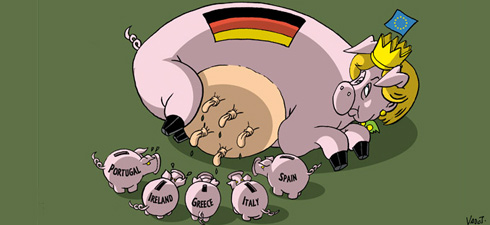Financial market investors and German politicians don’t really have a lot in common. Normally, the former don’t understand why the latter need so much time to implement the decisions they reach at a crisis summit. Conversely, the investors serve the politicians as the scapegoat of choice when it comes to who caused the crisis of the day.
There is one point, however, where both are unusually united: in their view of Germany’s fiscal policy, regarded as solid and a role model for all the southern countries in debt. Even when the facts look very different, it’s a boat no one really wants to rock.
And so the Christian Democratic Union’s chief whip, Volker Kauder, recently got away with declaring at the CDU convention that “Europe is speaking German now“. With this bit of chauvinist swagger, Kauder neatly summed up the politics of his Chancellor. Since the euro crisis broke out early in 2010, Angela Merkel’s mantra has been that if everyone could just save like the Germans, there wouldn’t be any problems.
You have to grant it to Merkel: apparently, she’s been rather convincing. In any case, the investors in the financial markets seem to believe the Federal Chancellor. While they’re demanding higher interest rates to buy government bonds from almost all the other eurozone countries, they’re giving their money to the German finance minister virtually at zero cost.
Germany is not saving
It’s hard to explain this rationally. Anyone who looks just a little deeper, of course, will naturally observe that countries like Spain or Italy are not nearly as badly off as the high interest rate spreads suggest. But he will certainly also discover that Germany is not the savings poster boy it claims to be.
In its latest 2011 forecast for Germany, the European Commission estimates a debt ratio of 81.7 percent of gross domestic product. That’s significantly more than the 60 percent the European stability pact sets out as the debt ceiling – that pact that the federal government regularly uses to beat the southern European countries about the ears with, and that it wants to swing even harder. A country that wants to bring in other tough rules would do well to stick to them itself first.
Luxembourg Prime Minister Jean-Claude Juncker is therefore right to get worked up about German domineering. Spain, for example, with a debt ratio of 69.6 percent, is considerably closer to complying with the Stability Pact than Germany is. Even the Dutch (64.2 percent) and the Finns (49.1 percent) have more right to put themselves forward as European disciplinarian than the Germans do.
The only thing that currently justifies trust in Germany’s public finances is the relatively low budget deficit ratio, i.e. the new borrowing relative to economic output. That the ratio is significantly less than it is in the southern states has many causes – but none of them has anything to do with the image of the “iron-willed savers” that the federal government loves to play up to.
Arrogant hymns to the discipline of the German state
On the contrary, Germany is not saving. Federal budget spending has gone up recently and, according to the financing plans, will stay relatively steady in the coming years at around 300 billion euros. The austerity package that’s part of it, and which was adopted last autumn with great deal of fuss, has changed as little as the “debt brake” that the Germans love to hawk around Europe.
The fact that the deficit ratio is nonetheless dwindling is due solely to the strong economy of the past year and a half, which has given the federal government unexpectedly high tax revenues and also driven GDP strongly upwards. Since the deficit ratio is calculated as the ratio of debt to GDP, it’s therefore falling. That has very little to do with saving.
Even the good economic situation has, so far, not been a result of Teutonic asceticism – at least not by the state. The high demand for German goods abroad is mainly due to the firms that make good products at relatively low cost.
The current government, however, with their arrogant hymns to the discipline of the German state, are bringing down much of Europe. In Greece, Spain or Italy – where the Germans were once valued for their virtues, at least – they are now seen primarily as arrogant taskmasters who want to tell the people on the rest of the continent how to live and how to work. That can’t bode well for the future.
Translated from the German by Anton Baer
Was this article useful? If so we are delighted!
It is freely available because we believe that the right to free and independent information is essential for democracy. But this right is not guaranteed forever, and independence comes at a cost. We need your support in order to continue publishing independent, multilingual news for all Europeans.
Discover our subscription offers and their exclusive benefits and become a member of our community now!












